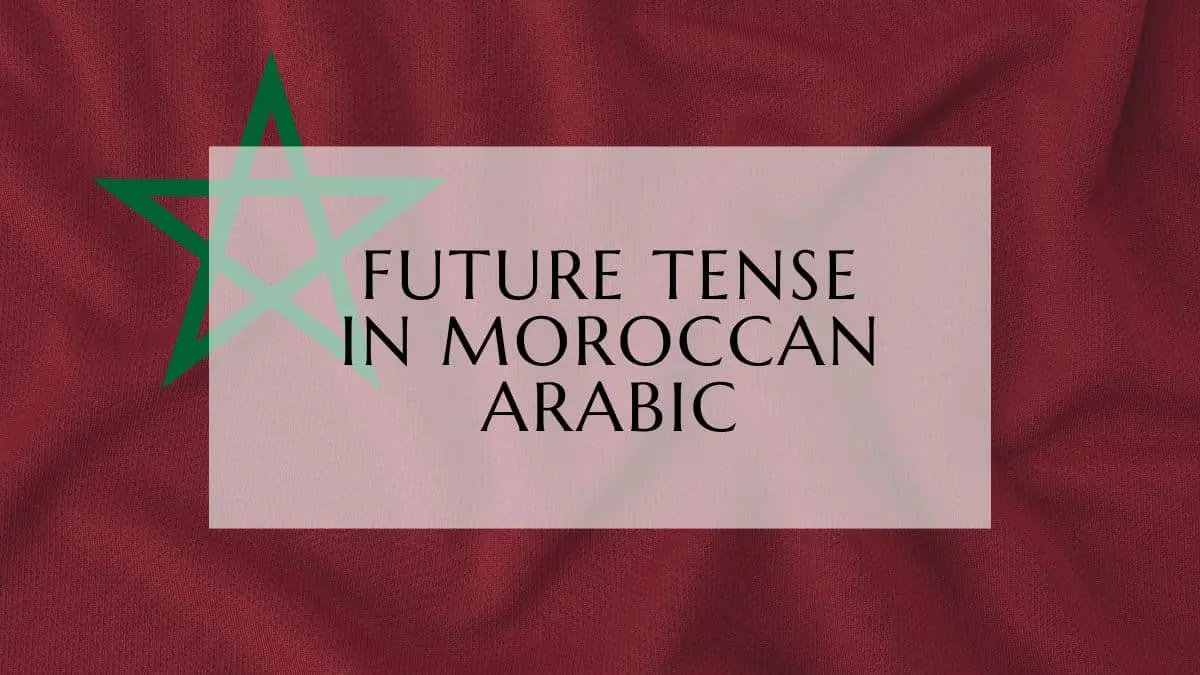In this lesson, we will talk about the future tense in Moroccan Arabic, the simple form used, and the word (prefix) that indicates the future, followed by examples. this lesson is quite easy but understanding the present tense will make it even easier. Let’s start!

The Future Tense In Moroccan Arabic
The Word Of The Future: Ghadi/Gha
If you hear the word ghadi/غادي (going) in a sentence, that indicates that the person is talking about the future. Note that the short form of ghadi is gha/غ and you can use the one you like.
The Future Tense Form In Moroccan Arabic
The future tense form in Darija follows this formula:
Future tense = ghadi/gha + the present form without the prefix ka/ta
Example: ktb (to write) in the future:
| English | Transcribed Moroccan Arabic | Using Arabic Alphabet |
| I | Ana ghadi nktb | أنا غادي نكتب |
| You (feminine, singular) | Nti / Ntiya ghadi tktbi | نتي / نتيا غادي تكتبي |
| You (masculine, singular) | Nta / Ntaya ghadi tktb | نتا / نتايا غادي تكتب |
| He | Howa ghadi yktb | هو غادي يكتب |
| She | Hia ghadi tktb | هي غادي تكتب |
| We | 7na ghadi nktbo | حنا غادي نكتبو |
| You (plural) | Ntuma ghadi tktbo | نتوما غادي تكتبو |
| They | Huma ghadi yktbo | هوما غادي يكتبو |
Example: ja (to come) in the future:
| English | Transcribed Moroccan Arabic | Using Arabic Alphabet |
| I | Ana ghadi nji | أنا غادي نجي |
| You (feminine, singular) | Nti / Ntiya ghadi tji | نتي / نتيا غادي تجي |
| You (masculine, singular) | Nta / Ntaya ghadi tji | نتا / نتايا غادي تجي |
| He | Howa ghadi yji | هو غادي يجي |
| She | Hia ghadi tji | هي غادي تجي |
| We | 7na ghadi njiw | حنا غادي نجيو |
| You (plural) | Ntuma ghadi tjiw | نتوما غادي تجيو |
| They | Huma ghadi yjiw | هوما غادي يجيو |
Example: gls (to sit) in the future:
| English | Transcribed Moroccan Arabic | Using Arabic Alphabet |
| I | Ana ghadi ngls | أنا غادي نجلس |
| You (feminine, singular) | Nti / Ntiya ghadi tglsi | نتي / نتيا غادي تجلسي |
| You (masculine, singular) | Nta / Ntaya ghadi tgls | نتا / نتايا غادي تجلس |
| He | Howa ghadi ygls | هو غادي يجلس |
| She | Hia ghadi tgls | هي غادي تجلس |
| We | 7na ghadi nglso | حنا غادي نجلسو |
| You (plural) | Ntuma ghadi tglso | نتوما غادي تجلسو |
| They | Huma ghadi yglso | هوما غادي يجلسو |
Note: you can practice what you’ve learned here, and learn how to pronounce each of the words in our Memrise course here, don’t know how to use the platform or sign up? we’ve got you covered in this easy-to-follow tutorial here.
Note that you can also conjugate the verb ghadi according to the pronoun, at the beginning I suggest that you keep things simple and use it as it is, but what about only saying (going)? :
Ghadi? Ghadya or Ghadyin?
Long story short, ghadya for feminine (including the pronoun I) and ghadyin for plural:
| English | Transcribed Moroccan Arabic | Using Arabic Alphabet |
| I am going (male) | Ana ghadi | أنا غادي |
| I am going (female) | Ana ghadya | أنا غاديا |
| You’re going (feminine, singular) | Nti / Ntiya ghadya | نتي / نتيا غاديا |
| You’re going (masculine, singular) | Nta / Ntaya ghadi | نتا / نتايا غادي |
| He’is going | Howa ghadi | هو غادي |
| She’s going | Hia ghadya | هي غاديا |
| We’re going | 7na ghadyin | حنا غاديين |
| You’re going (plural) | Ntuma ghadyin | نتوما غاديين |
| They’re going | Huma ghadyin | هوما غاديين |
Example of the future with ghadi conjugated, gls:
| English | Transcribed Moroccan Arabic | Using Arabic Alphabet |
| I (masculine) | Ana ghadi ngls | أنا غادي نجلس |
| I (feminine) | Ana ghadya ngls | أنا غاديا نجلس |
| You (feminine, singular) | Nti / Ntiya ghadya tglsi | نتي / نتيا غاديا تجلسي |
| You (masculine, singular) | Nta / Ntaya ghadi tgls | نتا / نتايا غادي تجلس |
| He | Howa ghadi ygls | هو غادي يجلس |
| She | Hia ghadya tgls | هي غاديا تجلس |
| We | 7na ghadyin nglso | حنا غاديين نجلسو |
| You (plural) | Ntuma ghadyin tglso | نتوما غاديين تجلسو |
| They | Huma ghadyin yglso | هوما غاديين يجلسو |
And since ghadi means “going to” Ana ghadi l dar means: I’m going home, as simple as that.
We suggest that you revise the lesson about the present tense if you still have doubts about the form used.
Happy learning!
